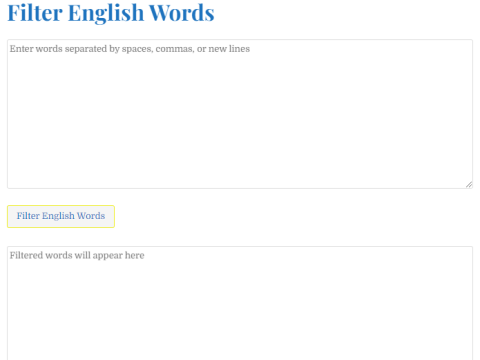Rare English Letter Pairs
An excellent and expanded list of letter combinations that are very unusual or almost never consecutive in English. I’ve collected them in a list titled “Rare English Letter Pairs.”
That’s an interesting challenge! While there aren’t strict “forbidden” consecutive letter combinations in English in the way some other languages might have them, there are many that are extremely rare or virtually non-existent in common English words. This is often due to phonetic reasons or the origins of words.
Key Reasons for Rarity:
Phonetics: Many combinations simply don’t make easily pronounceable sounds in English (e.g., “qb”, “zj”).
Orthography: English spelling rules and common letter patterns make certain sequences unlikely.
Loanwords: English has many words from other languages, which sometimes introduce unusual combinations, but they often get adapted. For example, “kvass” has ‘kv’, but it’s a loanword.
Digraphs/Trigraphs: Some combinations might exist but represent a single sound (e.g., ‘sh’, ‘th’, ‘ch’).
Consonant Clusters: While some consonant clusters are common (like ‘str’ or ‘scr’), others are virtually absent.
Rare English Letter Pairs
| bv |
| cb |
| cf |
| cg |
| cp |
| cv |
| cw |
| cx |
| db |
| df |
| dg |
| dp |
| dv |
| dw |
| dx |
| fx |
| fv |
| gb |
| gc |
| gd |
| gf |
| gp |
| gv |
| gx |
| gw |
| hb |
| hc |
| hd |
| hf |
| hg |
| hp |
| hv |
| hw |
| hx |
| jb |
| jd |
| jf |
| jg |
| jj |
| jp |
| jv |
| jw |
| jx |
| kb |
| kc |
| kd |
| kf |
| kg |
| kp |
| kv |
| kw |
| kx |
| lg |
| lp |
| lv |
| lw |
| lx |
| mc |
| md |
| mf |
| mg |
| mv |
| mw |
| mx |
| pb |
| pc |
| pd |
| pf |
| pg |
| pk |
| pv |
| pw |
| px |
| qb |
| qc |
| qd |
| qf |
| qg |
| qj |
| qk |
| ql |
| qm |
| qn |
| qp |
| qr |
| qs |
| qt |
| qv |
| qw |
| qy |
| qz |
| rz |
| sb |
| sd |
| sf |
| sg |
| sj |
| sv |
| sx |
| sz |
| tb |
| tc |
| td |
| tf |
| tg |
| tj |
| tp |
| tv |
| tx |
| tz |
| vb |
| vc |
| vd |
| vf |
| vg |
| vh |
| vk |
| vl |
| vm |
| vn |
| vp |
| vq |
| vr |
| vs |
| vt |
| vw |
| vx |
| vy |
| vz |
| wb |
| wc |
| wd |
| wf |
| wg |
| wj |
| wk |
| wl |
| wm |
| wn |
| wp |
| wq |
| ws |
| wt |
| wv |
| ww |
| wx |
| wy |
| xb |
| xc |
| xd |
| xf |
| xg |
| xh |
| xj |
| xk |
| xl |
| xm |
| xn |
| xp |
| xq |
| xr |
| xs |
| xt |
| xv |
| xw |
| xy |
| xz |
| yb |
| yc |
| yd |
| yf |
| yg |
| yh |
| yj |
| yk |
| yl |
| ym |
| yn |
| yp |
| yq |
| yr |
| ys |
| yt |
| yv |
| yw |
| yx |
| yz |
| zb |
| zc |
| zd |
| zf |
| zg |
| zj |
| zk |
| zl |
| zm |
| zn |
| zp |
| zq |
| zr |
| zs |
| zt |
| zv |
| zw |
| zx |
| zy |
| bk |
| fq |
| jc |
| jt |
| mj |
| qh |
| qx |
| vj |
| wz |
| zh |
| bq |
| mq |
| bx |
| fz |
| mz |
| gq |
| jh |
| jy |
| pq |
| jk |
| jz |
| tq |
| cj |
| jl |
| kq |
| qo |
| hk |
| jm |
| jn |
| kz |
| hz |
| jq |
| lq |
| qe |
| iy |
| jr |
| fk |
| js |
| mp |
| pp |
| sc |
| sp |
| sw |
| tw |
| wh |
| wr |
| bf: (e.g., “obfuscate” has it, but it’s rare at the start or middle of common words) |
| cj: (e.g., “conjunction” has it, but again, not truly consecutive letters from a phonetic standpoint) |
| cs: (unless it’s part of a compound word like “lincs”) |
| dj: (e.g., “adjust” but the sound is often different) |
| gg: (mostly found in compound words like “egg-head” or specific names) |
| lb: (except in some names or hyphenated words) |
| lf: (except in some specific words like “golf”) |
| mb: (common in words like “lament,” but can be rare in other contexts) |
| mp: (quite common) |


